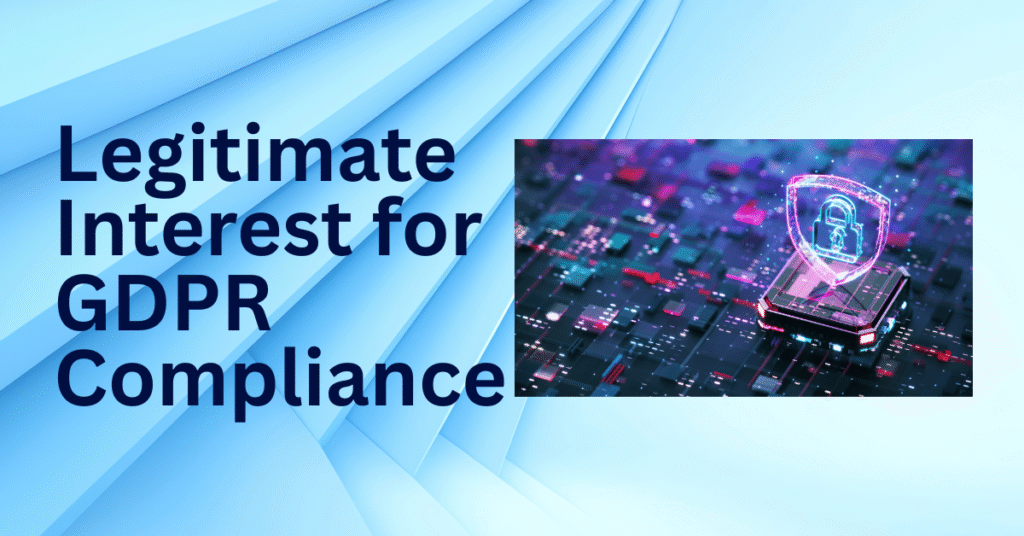
Key Takeaways
- Apply legitimate interest as a lawful basis.
- Perform a legitimate interest assessment first.
- Balance business needs with privacy rights.
- Avoid sensitive data and mass profiling.
- Ensure transparency in all processing activities.
Modern marketing thrives on data-driven personalization, yet every interaction must respect data privacy laws. Among the lawful bases for processing personal data, legitimate interest offers marketers valuable flexibility. It allows organizations to pursue meaningful business goals while maintaining fairness, transparency, and compliance with evolving regulations. But using this legal basis responsibly requires understanding when it applies, how to justify it, and how to protect individuals’ rights throughout the process.
What Is Legitimate Interest?
Legitimate interest (LI) serves as a legal basis for processing personal data when an organization’s needs are balanced against the individual’s rights. It applies when processing is necessary for business purposes such as fraud prevention, risk management, or direct marketing. However, the organization must ensure that the individual’s privacy expectations are not violated. In practice, this means collecting only what is needed and explaining clearly how the data will be used.
When applied correctly, it promotes accountability and responsible data processing. It encourages organizations to act ethically, aligning business benefits with customer trust — the foundation of sustainable data privacy strategies.
The Legitimate Interest Assessment (LIA)
Before adopting LI as a processing basis, organizations should conduct an assessment. This structured review ensures that privacy standards remain intact while meeting operational goals.
An effective LIA includes three essential components:
- Purpose test: Determine whether the data processing supports a legitimate goal that benefits your organization or third parties.
- Necessity test: Evaluate if the objective can be achieved through less intrusive means.
- Balancing test: Weigh your interests against the individual’s rights and freedoms to ensure fair data use.
Maintaining proper documentation of each test demonstrates transparency and accountability. These records not only strengthen regulatory defense but also enhance trust among data subjects who value openness in privacy practices.
Recognizing the Limitations
While LI offers flexibility, it cannot justify unrestricted data use. Businesses must understand its limits to avoid non-compliance.
- Sensitive data: Legitimate interest should not be used for health or biometric data unless clearly justified by law.
- Large-scale profiling: Avoid using legitimate interest for profiling activities that could lead to discrimination or invasive personalization.
- Individual objections: If a data subject objects, the organization must prove that its legitimate grounds outweigh the person’s preferences.
Transparency remains crucial. Communicating clearly about data processing activities, balancing tests, and individuals’ rights reinforces privacy transparency and lawful processing under GDPR.
Legitimate Interest in Practice
To visualize LI, consider a hiring scenario. Suppose your company interviews several candidates and keeps one promising profile on file for future roles. The candidate willingly provided information, and retaining it benefits both sides — the company gains a potential employee, and the candidate remains open to future opportunities. This is legitimate interest in action: mutually beneficial, ethical, and limited to reasonable expectations.
The same logic applies to marketing compliance. A company may analyze customer preferences to improve services, provided the process is necessary, proportionate, and aligned with data subject rights. Each action must respect the fine balance between personalization and privacy.
Legitimate Interest in Marketing
For marketers, LI can support targeted communication when consent isn’t the best option. However, success depends on transparency and ethical intent.
Organizations should:
- Document every legitimate interest assessment to justify decisions.
- Explain clearly why data is being processed and how long it will be retained.
- Regularly review personal data protection measures and customer feedback.
By applying legitimate interest responsibly, marketers build credibility and maintain compliant data-driven engagement.
Conclusion with CTA
Legitimate interest provides marketers with a path to achieve business goals while preserving trust. But responsible use requires discipline — organizations must balance necessity, fairness, and transparency in every processing activity. By conducting regular assessments, maintaining records, and prioritizing privacy communication, companies can stay compliant and ethical.
4Thought Marketing’s 4Comply software simplifies this process by guiding teams through legitimate interest assessments and compliance workflows. If you’re ready to strengthen your privacy strategy, connect with 4Thought Marketing today and begin your journey toward trusted, compliant marketing.
Frequently Asked Questions (FAQs)
What is legitimate interest under GDPR?
It’s a lawful basis allowing data processing when necessary for a business purpose that doesn’t override an individual’s privacy rights.
When can marketers use legitimate interest?
Marketers can rely on it for essential activities like customer engagement or fraud prevention if transparency and proportionality are ensured.
What are the steps in a legitimate interest assessment?
They include the purpose test, necessity test, and balancing test — all designed to evaluate fairness and compliance.
Can legitimate interest replace consent?
Not always. It applies only when consent isn’t practical, and the processing aligns with reasonable user expectations.
How does 4Comply help with legitimate interest?
4Comply provides automated tools for conducting assessments, documenting decisions, and managing GDPR compliance efficiently.





